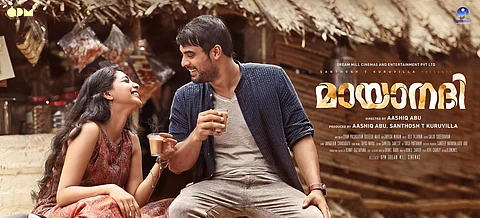

There is something about Mayaanadhi, Ashiq Abu's new Malayalam film, that is as mystical as its title. The film seemingly gravitates between genres but keeps the tone intact. Mayaanadhi's gaze, most sensitive gaze of all, doesn't flinch. Two threads run in parallel, a manhunt widening in real time and a lived relationship uncovering its past. Never a false moment in its 136-minute run, Mayaanadhi begins like a thriller, sways into romance territory, and keeps jumping timelines and genres at will.
We first see gangsters and criminals preparing for a job. But the gangster also has a PTA meeting to attend. It is night, a couple of handymen, possibly future dreaded gangsters, are lying down on the terrace, overlooking the Chennai Kapaleeshwarar temple and talking about an imagined future, a future of plush houses with fancy bathtubs. This constant push and pull is ever present - between life and job, between love and letting go, between matters of heart and self-respect, between career and family, between past and present.
The film is undoubtedly a romance, but even the thriller elements are handled with care. The gangsters, in the first few minutes, get the most delicate of touches, the camera (cinematography by Jayesh Mohan) doesn't pounce on them, neither do they on the camera. A gangster copies Mathan's (Tovino Thomas) order of Boost at a tea stall. They wait at the hotel lobby to book their rooms like weary tourists. If a child were to amble in, they might just pick it up and sing a lullaby. The camera in romantic films obviously caresses the couple, but in Abu's work, it caresses everybody with the same sense of benevolence. It looks at them as people first - a successful actress remotely controlled by her brother, a struggling actress running between auditions and her mother's machinations to find her a groom, a young boy with dreams of becoming a man, a young worldly wise police officer, a battle hardened police officer with sexism thriving in his veins. Even an ex-don turned travel agent gets his familial moment, married to a widow and offering long drives as a balm to his insomniac protege.
Malayalam cinema's new wave and its beauty lies in this egalitarian gaze. Odious men in these films are treated with gentle care, not in celebrating them, but in showing them as who they are, men shaped by deeds and circumstances, trying to deal with life or just trying to go about a job. Mayaanadhi has a beautiful climax, capped by an exchange between the young police officer (Harish Uthaman) and his superior (Ilavarasu), questioning the latter's assassination of a character. The final gunshot lands square on our chests and keeps ringing long after the film ends. For this effect, Abu's build-up of the tension between the senior and the junior from their very first frame is paramount. We see very little of them, but a few seconds of the senior here, a few seconds of the junior soon after his wedding there, and we buy all of this. The economy is astounding.
And that level of writing is a trend in Malayalam cinema with one name repeatedly figuring in the credits - Syam Pushkaran who shares writing credits in Mayaanadhi with Dilesh Nair. Pushkaran also wrote Dileesh Pothan's first film, Maheshinte Prathikaram, and was credited as creative director in Thondimuthalum Driksakshiyum. In both those films we gradually learn about the characters, and our perspectives on some people shift completely by the end.
Mayaanadhi does something similar with our perspective of eternal love, the equations between the couple reserved only for those that choose to be patient. We may see a stalker in Mathan first and there are no planned dates, but a relationship is rekindled and its beats gradually register, the two lives involved not having a relationship as much as rediscovering companionship. The mysticism is in charting this circle of life - a successful actress with no personal life gives it all up, the struggling actress replaces her in chiffon, the quest for a fancy bathtub ends on the banks of a beautiful river. That it should occur in a film where a director (played by Lijo Jose Pellissery) wonders about the difficulty in writing climaxes and another director laments the death of Malayalam cinema, is just the current finest filmmakers in India offering a knowing wink.